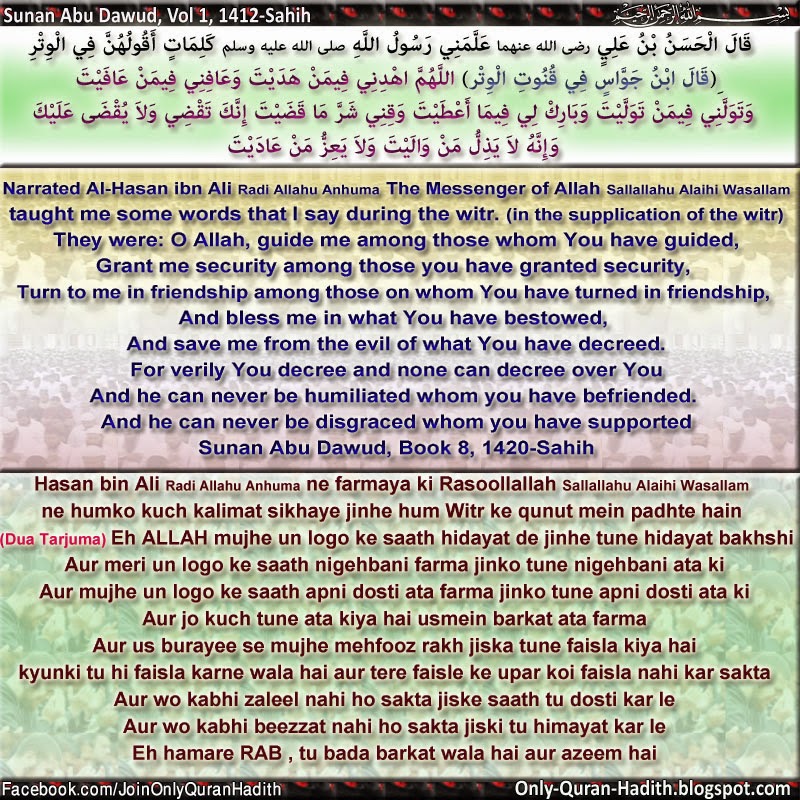

He said: What is mustahabb in our view is that which was narrated by al-Hasan ibn ‘Ali from the Prophet (SWS): “ Allahumma ihdini…” – the well-known hadīth. Ibn ‘Uqayl al-Hanbali narrated that duas narrated from Muhammad should be what is recited as regular word, and anything added to it is by way of a concession. Surely, the disbelievers shall incur your torment." O Allah! We worship you and prostrate ourselves before you, and we hasten towards you and serve you, and we hope to receive your mercy and we dread your torment. "O Allah! We invoke you for help, and beg for forgiveness, and we believe in you and have trust in you and we praise you, in the best way we can and we thank you and we are not ungrateful to you, and we forsake and turn away from the one who disobeys you. Allahumma iyya-ka na‘abudu, wa-laka nuṣallī wa-nasjudu, wa-ilay-ka nas‘ā wa-naḥfidu, wa-narjū raḥmataka wa nakhshā ‘azaba-k(a), in-nā ‘azaba-ka bi’l-kuffāri mulhiq. Wa-nashkuru-ka wa-lā nakfuru-ka wa-nakhla‘u wa-natru-ku may yafjuru-k(a). Hanafi commonly recite second version of supplication of Witr prayer ( Arabic:دعاء صلاة الوتر du‘ā’ ṣalātu ’l-Witr) as follows, which is said in the last raka‘at of witr (since one raka'at follows the Sunnah, in this case performing in odd numbers - 3,5,7,9 or 11 raka'ats), first by saying takbir with hands up, then saying the following verses before ruku‘: Indeed You decree, and none can pass decree, and none can pass decree upon You, indeed he is not humiliated whom You have befriended, blessed are You our Lord and Exalted.” “O Allah guide me among those You have guided, pardon me among those You have pardoned, befriend me among those You have befriended, bless me in what You have granted, and save me from the evil that You decreed. Narrated by Al-Hasan ibn Ali (who is the grandson of Muhammad, he said he was taught by Muhammad to say the qunūt du‘ā’ in Arabic as follows: By offering the odd raka'at of witr as the last prayer of the night, a chord is created by pairing these two un-paired raka'ats of each of the maghrib's and witr's. It has an un-paired (odd) number of raka'at. Considering the whole day as a circle along which all the prayers are located, the maghrib salat is offered at the sunset (beginning of the night). The literal meaning of witr is "chord of a circle". It is recorded that Ali bin Abu Talib said, "The witr prayer is not required like your obligatory prayers but the Prophet would perform the witr prayer and say, 'O you people of the Quran, perform the witr prayer, for Allah is One and He loves the witr.'" Therefore, he or she who performs tahajjud (night prayer) regularly should perform witr after tahajjud. If someone fears that he would not be able to awake, or may die in their sleep, then the prayer should be performed before sleeping. īut there are many aḥādīth that show the best time for the witr salat to be at night. In a hadith transmitted by Abu Darda, he states that Muhammad enjoined to him three things: to fast three days every month, to offer the witr salat before sleep, and to offer two raka'at sunnah for fajr. Therefore, as little as one raka'ah can be prayed, and eleven at most.Īccording to Abdullah ibn Umar, Muhammad said, "The night prayer is offered as two raka'at followed by two raka'at and so on and if anyone is afraid of the approaching dawn (fajr prayer), he should pray one raka'ah and this will be a witr for all the raka'at which he has prayed before."

Witr has an odd number of raka'at prayed in pairs, with the final raka'ah prayed separately.

Witr ( Arabic: وتر) is an Islamic prayer ( salat) that is performed at night after Isha (night-time prayer) or before fajr (dawn prayer).


 0 kommentar(er)
0 kommentar(er)
